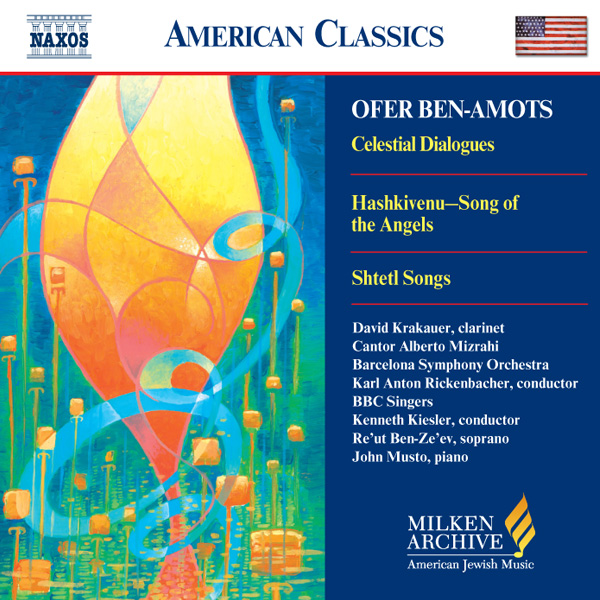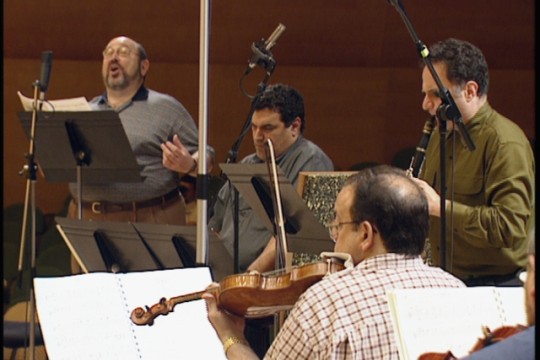Track |
Time |
Play |
| I - Am kadosh |
03:43 |
|
| II - Uv'yom hashabbat |
04:13 |
|
| III - A gasn nign |
04:14 |
|
| IV - Adonai melekh |
07:13 |
|
| V - The Celestial Freylekh |
05:18 |
|
| VI - Dinen |
04:15 |
|
Liner Notes
The composer views this work as a “stylistic confrontation” between a klezmer clarinet solo—deriving from the haunting virtuoso sounds typical of traditional eastern European Jewish bands—and cantorial vocal passages that emanate from age-old Ashkenazi liturgical ritual. The piece also constitutes what he calls “a dichotomy between song and dance, which at the conclusion become one and the same expression: a prayer.” The strings—which function simultaneously as collective participant, audience, and echo—for the most part represent a worshiping congregation experiencing what a congregation engaged in true prayer would: a process of spiritual purification.
I. Am kadosh (Holy Folk)
This is an introductory cadenza in which the two soloists make their initial entrances and musical statements. The movement’s title, Am kadosh (Holy Folk), refers to a traditional call to Jews to arise for morning prayers—“to serve the Creator.” It echoes an old common practice among Jews, especially in small towns and villages, or in certain religious neighborhoods in Israel (and previously in Palestine), particularly during the period of the yamim nora’im (Days of Awe)—during the days immediately preceding Rosh Hashana and the “ten days of repentance” between Rosh Hashana and YomKippur—when the s’liḥot liturgy (penitential prayers) is recited at the daily morning services (shaḥarit).The local shammash (beadle) would go from house to house at dawn, knocking on each door to awaken the inhabitants and calling on them to hasten to the synagogue to join the congregation for morning prayers. Thus did observant Jews begin each day in those traditional surroundings, as they still do.
II. Uv'yom hashabbat (The Sabbath Day)
The focus here is on the cantor’s song. Its nusaḥ hat’filla (the prescribed traditional musical formulas and modes for specific prayers, sections of services, and specific days or holydays in Ashkenazi ritual) here is centered around a single principal focal pitch (the reciting tone of the chant), which is given a continuous rumbling sound in the cellos and basses.
III. A gasn nign (A Street Song)
In this movement the clarinet takes the lead in a purely instrumental tune reminiscent of Jewish bands in eastern European towns and villages—klezmorim—who typically played these type of melodies in the street, particularly when welcoming the guests as they arrived to participate in a wedding ceremony.
IV. Adonoi Melekh (God, the King)
This is an emphatic proclamation of God’s sovereignty, expressed by solid support from the entire ensemble. The marked, even exaggerated individuality of the solo parts, and the contrast between them, symbolize the individuality and uniqueness of each worshiper as a participant in the communal prayer. These three phrases affirming God’s eternal sovereignty—past, present, and future—derive from the Bible and occur in this combination throughout the Hebrew liturgy.
V. Celestial Freylekh
The instrumental peak of the entire work is this traditional eastern European Jewish wedding dance of joy, the freylekh. The movement begins with a solo recitative for the clarinet and continues with the orchestra as it becomes a perpetual-motion wedding dance, symbolizing a marriage between heaven and earth—between man and God, and between humanity and its Divine source.
VI. Dinen (Serve!)
The composer describes this concluding movement as “a quietly ecstatic setting” based on a Hassidic melody attached to a piyyut (liturgical poem) recited in the Yom Kippur liturgy and, in some traditions, every Sabbath. This prayer traverses the entire Hebrew alphabet in the acrostic of its strophes, punctuated after each one by the refrain “To You whose life is eternal.” Ben-Amots has employed this melody as an illustration of the way in which the major mode is often reserved in Hebrew liturgy “for the most serene and solemn moments.”
By: Neil W. Levin
Lyrics
AM KADOSH (HOLY PEOPLE)
Sung in Yiddish and Hebrew
Holy folk!
Wake up and go
Worship the Creator of the World.
I gave you good counsel;
Forsake not my Torah.
It is a tree of Life
To those who hold on to it steadily,
And all who uphold it find happiness.
Wake up and go
Worship the Creator of the World.
Holy folk,
A Holy People.
UV'YOM HASHABBAT (ON THE SABBATH DAY)
Sung in Hebrew
Numbers 28:9—Sabbath liturgy
On the Sabbath Day—two yearling lambs without blemish
[for the additional sacrificial ritual in the Temple].
A GASN NIGN (A STREET TUNE) - Instrumental
ADONOI MELEKH (THE LORD IS KING)
Sung in Hebrew
The Lord is King,
The Lord was King,
The Lord shall reign for all eternity.
CELESTIAL FREYLEKH - Instrumental
DINEN (SERVE)
Sung in Yiddish and Hebrew
Oh, serve!
Serve, we will serve,
Serve, we must serve.
Oh, serve!
Serve, we have to serve,
We will serve,
We must serve,
We have to serve,
The Creator of the World.
Glory and faithfulness [we ascribe]
To You whose life is eternal.
Oh, serve!...
Insight and blessings [emanate from]
You whose life is eternal.
Serve, we have to serve,
We will serve...
Grandeur and greatness [we ascribe]
To You whose life is eternal.
AM KADOSH
Sung in Yiddish and Hebrew
am kadosh,
shteyt oyf un geyt
l’avodas habore.
ki lekaḥ tov nattati lokhem,
torati al ta’azovu.
etz ḥayyim he la’maḥazikim ba,
v’tom’khe’ha m’ushar;
shteyt oyf un geyt
l’avodas habore.
am k’doshim
am kadosh.
UV'YOM HASHABBAT
Sung in Hebrew
Numbers 28:9—Sabbath liturgy
uv’yom hashabbat,
shney kh’vasim
b’ney shana t’mimim.
A GASN NIGN (A STREET TUNE) - Instrumental
ADONAI MELEKH
Sung in Hebrew
adonoi melekh,
adonoi malakh,
adonoi yimlokh l’olam va’ed.
CELESTIAL FREYLEKH - Instrumental
DINEN
Sung in Yiddish and Hebrew
oy dinen,
dinen vet men dinen,
dinen muz men dinen.
oy dinen,
dinen darf men dinen.
vet men dinen,
muz men dinen,
men darf dinen
dem boyre oylem,
ha’adderet v’ha’emuna
l’ḥay olamim.
oy dinen....
habina v’hab’rakha
l’ḥay olamim.
dinen, dinen, dinen....
hag’vura v’hag’dula
l’ḥ ay olamim.
Credits
Composer:
Ofer Ben-Amots
Length: 29:01
Genre: Symphonic
Performers:
Barcelona Symphony-National Orchestra of Catalonia;
David Krakauer, Clarinet;
Alberto Mizrahi, Tenor;
Karl Anton Rickenbacher, Conductor
Date Recorded: 06/01/2001
Venue: Sala Sinfonica del Auditori (B), Barcelona, Spain
Engineer: Kornacher, Bertram
Assistant Engineer: Weir, Simon
Project Manager: Schwendener, Paul
Additional Credits: Publisher: The Composer’s Own Press
Translations/Transliterations: Eliyahu Mishulovin


